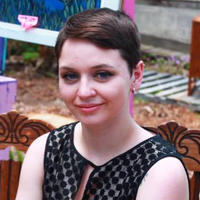Student receives SMART Scholarship to fund five years of graduate education
Florida State University graduating senior Carli J. “C.J.” Kelsheimer has received a prestigious SMART Scholarship, which will fully fund her doctoral studies for the next five years.

SMART Scholarship recipient Carli J. “C.J.” Kelsheimer.
Kelsheimer, 21, a biochemistry and psychology dual major from Detroit, plans to pursue a doctorate in analytical chemistry at the University of Pittsburgh, beginning in June.
“I am both honored and humbled to have been given this opportunity,” Kelsheimer said. “I am excited to be able to work toward furthering the fields of analytical and forensic chemistry, as well as to represent Florida State in my future pursuits.”
SMART Scholarships — "Science, Mathematics & Research for Transformation" — are awarded through the Department of Defense’s National Defense Education Program. They are intended to increase the nation’s number of civilian scientists. After completing their doctoral degrees, scholarship recipients work for the Department of Defense for the same number of years that their scholarships funded.
The scholarship will allow Kelsheimer to begin conducting research during her first semester at Pittsburgh.
“I won’t have to teach for the university, which is a common way that graduate students pay for school,” she said.
Kelsheimer’s success epitomizes what can develop through the exceptional opportunities available to undergraduate scientists at Florida State, according to Craig Filar, director of the university’s Office of National Fellowships.
“Through her work at FSU, C.J. has displayed a winning combination of intellect, curiosity and determination,” Filar said. “Her selection as a SMART Scholarship recipient is a testament to not only her excellence and dedication to research, but also to the incredible education she has received from her faculty mentors and to the support she has received from across our campus.”
As an undergraduate at Florida State, Kelsheimer conducted research in the area of physical organic chemistry under the direction of chemistry and biochemistry Professor Igor Alabugin. In addition, she examined technology and the effect it can have on cognitive aging while working under the direction of psychology Professor Neil Charness and psychology Associate Professor Walter Boot in the university’s Center for Research and Education on Aging and Technology Enhancement (CREATE).
“While I will not be continuing research in organic chemistry or psychology, my research interests are at the apex of chemistry and psychology, and I hope to study how the brain works on a chemical level at some point in my career, likely after my DOD commitments are finished,” she said.

